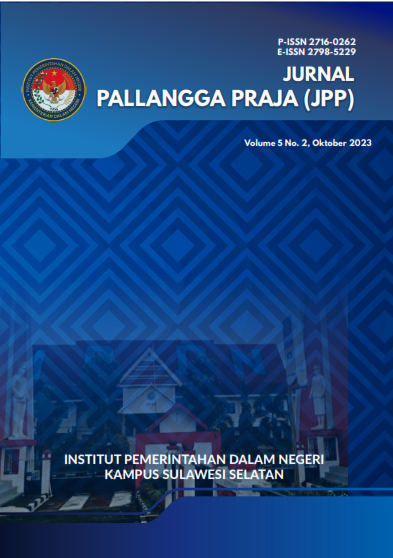Integration of Technology In Public Services As An Effort to Enhance Government Organizational Resilience In Indonesia
Keywords:
Technology, Public Service, SPBE, Organizational Resilience, GovernmentAbstract
Digital transformation has become a strategic necessity in strengthening the resilience of government organizations, especially in the face of health crises, natural disasters, and socio-economic pressures. This study aims to analyze how the integration of technology in public services contributes to enhancing organizational resilience in Indonesia’s public sector. A qualitative approach was employed using a case study design focused on a government institution implementing Electronic-Based Government Systems (SPBE). Data collection techniques included in-depth interviews, policy document analysis, and participatory observation. The findings reveal that technological integration through SPBE and digital platforms has improved service continuity, enhanced institutional adaptive capacity, and fostered faster decision-making and cross-sectoral collaboration. However, challenges such as digital infrastructure disparities, uneven digital literacy, and fragmented policy coordination between central and local governments remain significant barriers. The study concludes that technology must be strategically positioned as a long-term component in building public sector resilience.
Downloads
References
Anggraeni, D. (2016). Bureaucratic Reform in the Empirical Perspective and Pathology. International Journal of Kybernology, 3(2), 1–14.
Büyüközkan, G., Havle, C. A., & Feyzioğlu, O. (2021). Digital competency evaluation of low-cost airlines using an integrated IVIF AHP and IVIF VIKOR methodology. Journal of Air Transport Management, 91, 101998. https://doi.org/https://doi.org/10.1016/j.jairtraman.2020.101998
Creswell, J. W., & Clark, V. L. P. (2017). Designing and conducting mixed methods research. Sage publications.
Crusoe, J., Magnusson, J., & Eklund, J. (2024). Digital transformation decoupling: The impact of willful ignorance on public sector digital transformation. Government Information Quarterly, 41(3), 101958. https://doi.org/https://doi.org/10.1016/j.giq.2024.101958
Hinings, B., Gegenhuber, T., & Greenwood, R. (2018). Digital innovation and transformation: An institutional perspective. Information and Organization, 28(1), 52–61.
Huang, S., Wang, Y., Gong, X., & Deng, F. (2025). Digital transformation and enterprise market value: a perspective on knowledge search and recombination. Journal of Knowledge Management. https://doi.org/10.1108/JKM-09-2024-1050
Ivanova, T., Kozhyna, A., Lelechenko, A., Derun, T., & Slobozhan, O. (2021). Digital transformation in public administration: Evaluating the adoption and impact of technological innovations in government operations. Salud, Ciencia y Tecnología - Serie de Conferencias, 3, 1142. https://doi.org/10.56294/sctconf20241142
Jia, H. (2024). Government Digital Transformation and the utilization of Basic Public Health Services by China’s migrant population. BMC Public Health, 24(1). https://doi.org/10.1186/s12889-024-20730-3
Mai, B. T., Nguyen, P. V., Ton, U. N. H., & Ahmed, Z. U. (2023). Government policy, IT capabilities, digital transformation, and innovativeness in Post-Covid context: case of Vietnamese SMEs. International Journal of Organizational Analysis. https://doi.org/10.1108/IJOA-11-2022-3480
Maswati, R. (2023). Bureaucratic Pathology in Public Services at The Office of the Department of Population and Civil Registration of Supiori District. Pasundan Social Science Development, 3(2).
Mergel, I., Edelmann, N., & Haug, N. (2019). Definindo a transformação digital: resultados de entrevistas com especialistas. Government Information Quarterly.
Mishra, A., Misra, D. P., Babbar, S., & Mahapatra, S. S. (2021). Open Government Data: A Way to Knowledge Discovery, Innovation, and Transparency. In Citizen Empowerment through Digital Transformation in Government (pp. 191–202). CRC Press. https://doi.org/10.1201/9781003111351-11
Niu, F. (2022). The Role of the Digital Economy in Rebuilding and Maintaining Social Governance Mechanisms. Frontiers in Public Health, 9, 819727. https://doi.org/10.3389/fpubh.2021.819727
Ohemeng, F. L. K., Obuobisa Darko, T., & Amoako-Asiedu, E. (2019). Bureaucratic leadership, trust building, and employee engagement in the public sector in Ghana. International Journal of Public Leadership. https://doi.org/10.1108/ijpl-05-2019-0018
Pariyasiri, A. (2022). Digital Transformation of Public Service by MAEHIA Municipality. International Conference on Digital Government Technology and Innovation, DGTi-Con 2022 - Proceedings, 60–65. https://doi.org/10.1109/DGTi-CON53875.2022.9849201
Patton, M. Q. (2005). Qualitative research. In Encyclopedia of statistics in behavioral science. Wiley Online Library.
Profiroiu, C. M., Negoiță, C. I., & Costea, A. V. (2024). Digitalization of public administration in EU member states in times of crisis: the contributions of the national recovery and resilience plans. International Review of Administrative Sciences, 90(2), 336–352. https://doi.org/10.1177/00208523231177554
Troshani, I., Janssen, M., Lymer, A., & Parker, L. D. (2018). Digital transformation of business-to-government reporting: An institutional work perspective. International Journal of Accounting Information Systems, 31, 17–36. https://doi.org/https://doi.org/10.1016/j.accinf.2018.09.002
Weerakkody, V., Omar, A., El-Haddadeh, R., & Al-Busaidy, M. (2016). Digitally-enabled service transformation in the public sector: The lure of institutional pressure and strategic response towards change. Government Information Quarterly, 33(4), 658–668. https://doi.org/https://doi.org/10.1016/j.giq.2016.06.006



